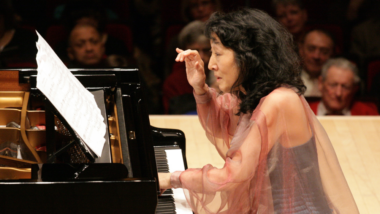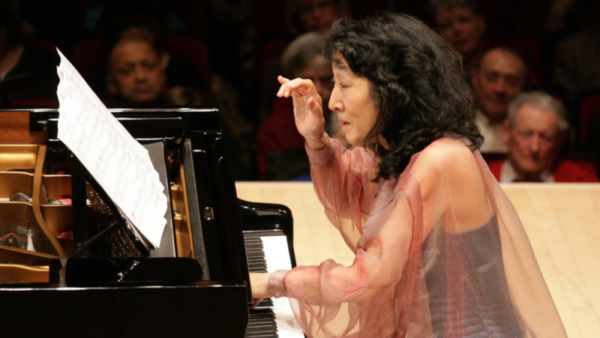 United Kingdom Kurtág, Mozart, R. Schumann: Dame Mitsuko Uchida (piano). Royal Festival Hall, London, 29.4.2022. (CC)
United Kingdom Kurtág, Mozart, R. Schumann: Dame Mitsuko Uchida (piano). Royal Festival Hall, London, 29.4.2022. (CC)

Kurtág – Játékok, Book 3, Play with Infinity (1979)
Mozart – Fantasia in C minor, K 475 (1785)
Kurtág – Játékok: Book 3, Hommage à Schubert (1979); Book 2, Antiphony in F sharp (1979); Book, 5, Capriccioso-luminoso (for Jeno Szervansky’s 80th birthday) (1997); Book 3: Dirge 2 (1979); Book 7, Fugitive thoughts about the Alberti bass (2003)
Mozart – Piano Sonata No.17 in B flat, K 570 (1789)
Kurtág – … couple égyptien en route vers l’inconnu ,.. (2013)
R. Schumann – Davidsbündlertänze, Op.6 (1837)
This was certainly one of the most thought-provoking concerts of this season – a world away in spirit and ethos from Yuja Wang’s recent recital – Dame Mitsuko Uchida offered a first half which paired music by György Kurtág (born 1925) with Mozart exquisitely, while offering Kurtág and his Romantic era alter ego of the miniature, Robert Schumann, in the second.
Despite championing by the highest musical strata, Kurtág’s music has yet to receive its full due. In September last year in the Kammermusiksaal of Berlin’s Philharmonie and as part of the Berlin Festival, Pierre-Laurent Aimard offered a concert of no fewer than 33 pieces from Játékok coupled with music by Jan Pieterszoon Sweelinck (1562-1621) and Mark Andre (born 1964). Full 21 of Aimard’s selection were world premieres – Kurtág’s work continues, while both Aimard and Uchida proved that Kurtág’s music illuminates the sounds around it.
In Uchida’s case, it was Kurtág and Mozart in the first instance. Kurtág’s ‘Play with Infinity’ from the third Játékok book is a fascinating piece, exploring the registral extremes of the piano within a quiet, at times, barely audible dynamic. It lasts less than a minute, its scalic descent against pointillist droplets of sound creating a space outside of time.
It was as if those keyboard extremes coalesced on middle C at the opening of the famous Mozart C minor Fantasia (correctly shorn of the C minor Sonata it is usually paired with). Mozart is very much Uchida’s home turf of course, and all the qualities we associate with her Mozart were there: clarity, impeccable phrasing, the finest musicianship. But here when we heard a sequence of descents it somehow felt related to the Kurtág – different viewpoints of a similar object, perhaps. Uchida’s voice-leading in Mozart is unparalleled; and perhaps her highest achievement here was to project the tremolos without any sense of kitsch. The clarity of her bass-lines was remarkable – as was the silence at the end, so incredibly powerful.
While the quiet, dissonant chords of the Hommage à Schubert offered up a dark atmosphere, its use of repetition perhaps acted as a reflection of Schubert’s handling of material in his famous Impromptus. Lovely to hear the disjunct, Webernian lines performed with such a cantabile, legato touch before the ‘Antiphony in F sharp’ brought in a sense of echo so characteristic of Venetian music. A mere 40 second or so, the addition of gestures around the call-and-response was perfectly judged by Uchida. As were the glittering, extreme upper-register rapid blink-and-you-miss them gestures of the Capriccioso-luminoso (less than 30 seconds in toto), offered in maximal contrast to the fat darker Dirge 2, its lines markedly, even angrily, disjoined and distinct. Finally for the Kurtág group, a dream-like deconstruction of the Alberti bass (Fugitive thoughts about the Alberti bass).
Once more Mozart benefitted from the deal, here the more extended complete late sonata in B flat, K 570. Uchida’s recording of this is a work of art; heard after the Kurtág, though, the plain octaves of the opening took on an extra layer of purity, their sense of an ‘essence’ directly mapping onto Kurtág’s world. Including the exposition repeat heightened this impression, allowing us to revel in Mozart’s inventiveness anew; it is amazing how fresh Mozart sounds after Kurtág, and how one appreciates both composers’ strengths via juxtaposition. If the opening of the central Adagio felt a little fragmented, one assumes this was deliberate, although it did rather feel as if the magic kicked in when the contrasting section arrives. The finale, the epitome of ‘gracioso’ (the marking is just ‘Allegretto’) was the epitome of charm married with depths teasingly hinted at by Mozart.
Finally for the first half, Kurtág’s … couple égyptien en route vers l’inconnu … (An Egyptian couple on the way to the unknown …), one of a set of two pieces composed in 2013 inspired by an exhibit in the Louvre in Paris of a couple holding hands probably from the Sixth Dynasty, between 235—2200 BCE. It is actually written for ‘upright piano (con supersordino) or pianoforte’ and of course we heard the latter in a stunningly hypnotic performance, full of transcendent beauty that, like Mozart, takes us to another world. (The ‘supersordino’ refers to an upright with a permanently depressed mute pedal).
Fascinating to marry Kurtág and Robert Schumann in one evening, too, both masters of the miniature, here via Schumann’s Davidsbündlertänze. Uchida is a chameleon of the keyboard – within the auspices of her own core sound (beautiful, never breaking the Steinway’s tone); she moves from Mozart and Kurtág to Schumann effortlessly, conveying Schumann’s lines tellingly and with huge amounts of character. From tender (No.2, ‘Innig’), to robust (No.3, ‘Mit Humor’) to the gentle play of No.5, ‘Einfach’ and the perfect bass staccato of No.6 (‘Sehr rasch’), Schumann’s writing was impeccably honoured while tracing a sense of the totality towards the supremely touching No.17 (‘Wie aus der Ferne’ / As if from the distance) and the final, gently teasing ‘Nicht schnell’. Many years ago, it was Maurizio Pollini who gave a state-of-the-art Davidsbündlertänze in this very hall; in an arch stretching across the decades, his excellence was equalled – with a very different aesthetic – by Uchida’s performance. Uchida is more intimate; she draws one into her performances – there is little of the Italian’s famed objectivity. And how it worked in this, one of Schumann’s most exquisite offerings: listening to how Uchida teased out the dissonances from the score resulted in some heart-breaking moments. Simply superb.
In vast contrast to Yuja Wang’s recent recital at the RFH, which overflowed with encores, Uchida offered just one micro-encore (indicating ahead with a gesture that it was ‘tiny’): ‘Aveu’ (Confession) from Schumann’s Carnaval, impeccable and beautifully shaped, a tender whisper of farewell to us, the audience.
Colin Clarke
